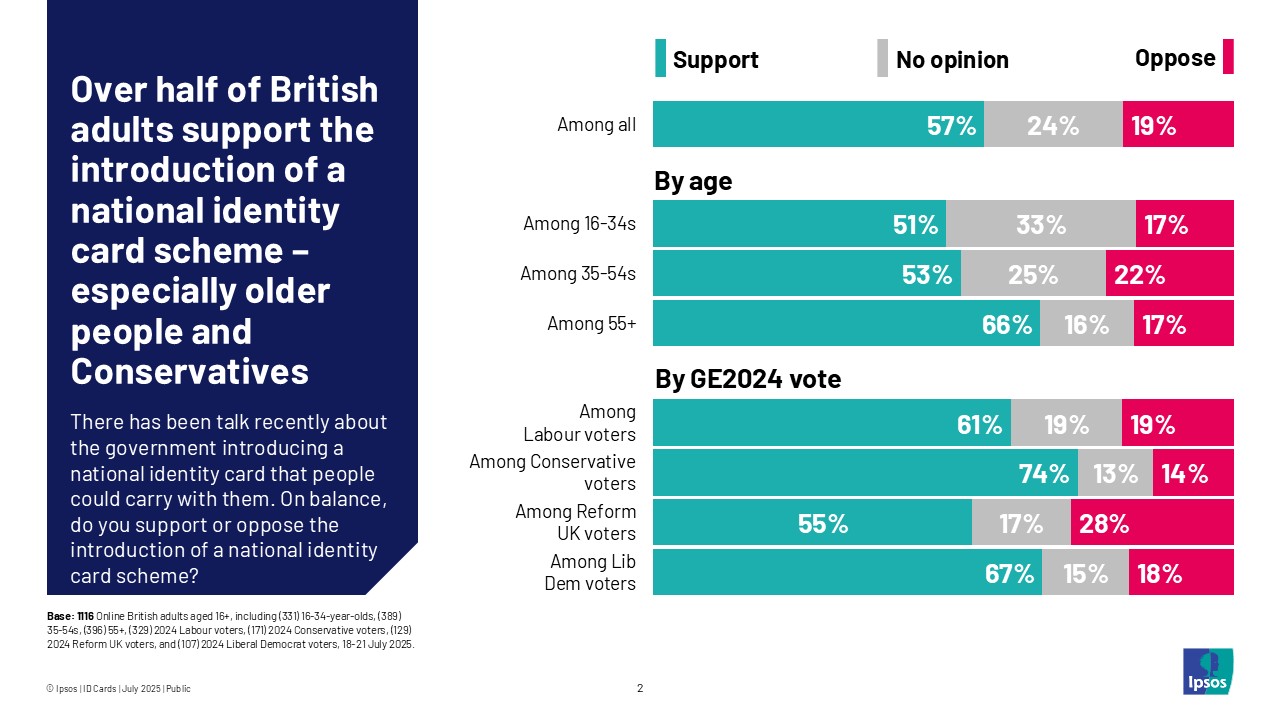57% of Britons support national ID card scheme, but have significant concerns over data security and implementation
New data from Ipsos in the UK shows that over half (57%) of Britons support the introduction of a national identity card scheme. The poll, which surveyed 1,116 British adults between 18-21 July 2025, finds that support is strongest among older age groups, with two-thirds (66%) of those aged 55 and over in favour, compared to half (51%) of 16-34 year-olds. Politically, 2024 Conservative voters show the highest level of support at 74%, followed by Liberal Democrat voters (67%) and Labour voters (61%). Reform UK voters show the lowest level of support at 55%. However, when asked about support for specifically digital ID cards at the end of the survey, after a number of questions about the pros and cons of ID cards, support is more split, with 38% in favour and 32% opposed.

Key findings
- Reasons for support: The public sees practical benefits to an ID card. The most popular reasons for supporting the scheme include having a single card to act as ID, passport, and driving licence (43%), making it easier to prove one's identity (41%), preventing illegal immigration (40%), having important medical information to hand in case of an accident (40%), and for general security (40%).
- Privacy concerns: Conversely, concerns about data privacy are seen as the best reasons to be against ID cards (those who are actually opposed to the scheme also highlight a belief that they are unnecessary). Almost a third of the public overall worry about personal data being used without permission (32%), sold to private companies (31%), or the system being open to abuse (31%). 28% say that they are worried about a potential security breach (it is important to note that fieldwork was conducted in the immediate aftermath of the revelation of the Afghan data leak). Furthermore, 4 in 10 (39%, rising to around half of both young people and Reform UK voters) are concerned about ID cards having a negative impact on civil liberties, though 50% are not (concern also appears higher than in a 2004 survey when it stood at 24%, though given changes in the survey methodology since then trends need to be interpreted with caution).
- Lack of trust in government: Confidence in the government to handle the scheme is low. A majority of Britons lack confidence in the government to hold personal information securely (51%, up from 41% in 2004*). Furthermore, 61% are not confident that the government could introduce the scheme smoothly, pessimism a very similar figure to the 58% in 2004.
- 1 in 3 lack enthusiasm for carrying cards: While a majority (58%) say they would be happy to carry an ID card at all times, this appears to have fallen from 83% in 2004 (though note change in methods since then). A third, 32%, do not want to carry an ID card at all times, almost twice the figure in 2004 (17%). Similarly, people would rather police allow people a week to present their ID card on demand, rather than be able to compel someone to produce their card on the spot (39% vs 27%).
- What Information is acceptable? Britons are most willing to see their date of birth (66%), a photograph (59%), and blood type (54%) stored on an ID card. However, there is significant opposition to including more sensitive information, with 40% opposed to storing DNA details, 36% opposed to fingerprints and 34% against social security records. Willingness to include almost all types of data appears to have decreased since 1995*.
- A split on digital IDs after more consideration: The public is divided on the idea of a specifically digital ID card, with 38% in support and 32% opposed. This question came at the end of the survey after a number of questions about different aspects of ID cards, and while support for a digital ID card was lower than initial support for a national identity card for all groups, the biggest falls were among older people (just 31% of whom supported a digital ID card, compared with 50% of 18-34s) and among Conservative 2024 supporters (of whom 39% supported a digital ID card, though still more than Reform UK voters at 30%).
Commenting on the findings, Gideon Skinner, Senior Director of UK politics at Ipsos said:
On the surface, a majority of Britons support the principle of a national ID card, seeing the practical upsides for daily life and for its potential to control illegal immigration. However, these latest findings also reveal significant concerns from the public around data security and a lack of confidence in the government's ability to manage large, complex IT projects – while the details of exactly what data ID cards might hold will also make a difference. We have seen British public support for the concept of ID cards in principle in Ipsos data going back decades, although there are some indications that there is slightly less enthusiasm and more questions about its implications in today’s circumstances. There have been calls on Labour to introduce a digital ID card scheme, but If the government wants to ensure that the public’s initial support lasts through to implementation of the policy in practice, they will need to convince people that their personal information will be safe, and the system will be introduced and run competently.
Technical note:
- Ipsos interviewed a representative sample of 1,116 adults aged 16+ across Great Britain. Polling was conducted online between the 18th-21st July 2025.
- Data are weighted to match the profile of the population. All polls are subject to a wide range of potential sources of error.
- * Historical comparisons are from Ipsos telephone polls conducted in 1995 and 2004. It is important to note the change in methodology from telephone to online when considering these comparisons, and to treat trends with caution.



